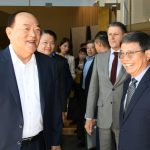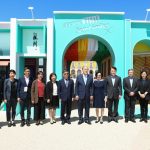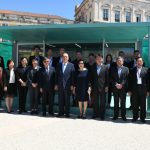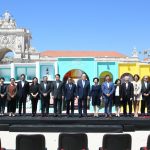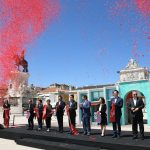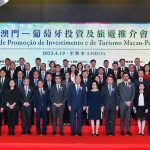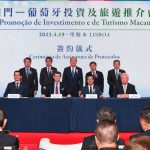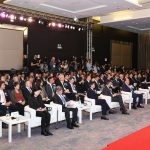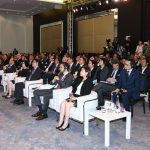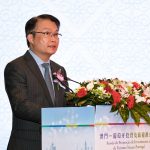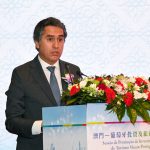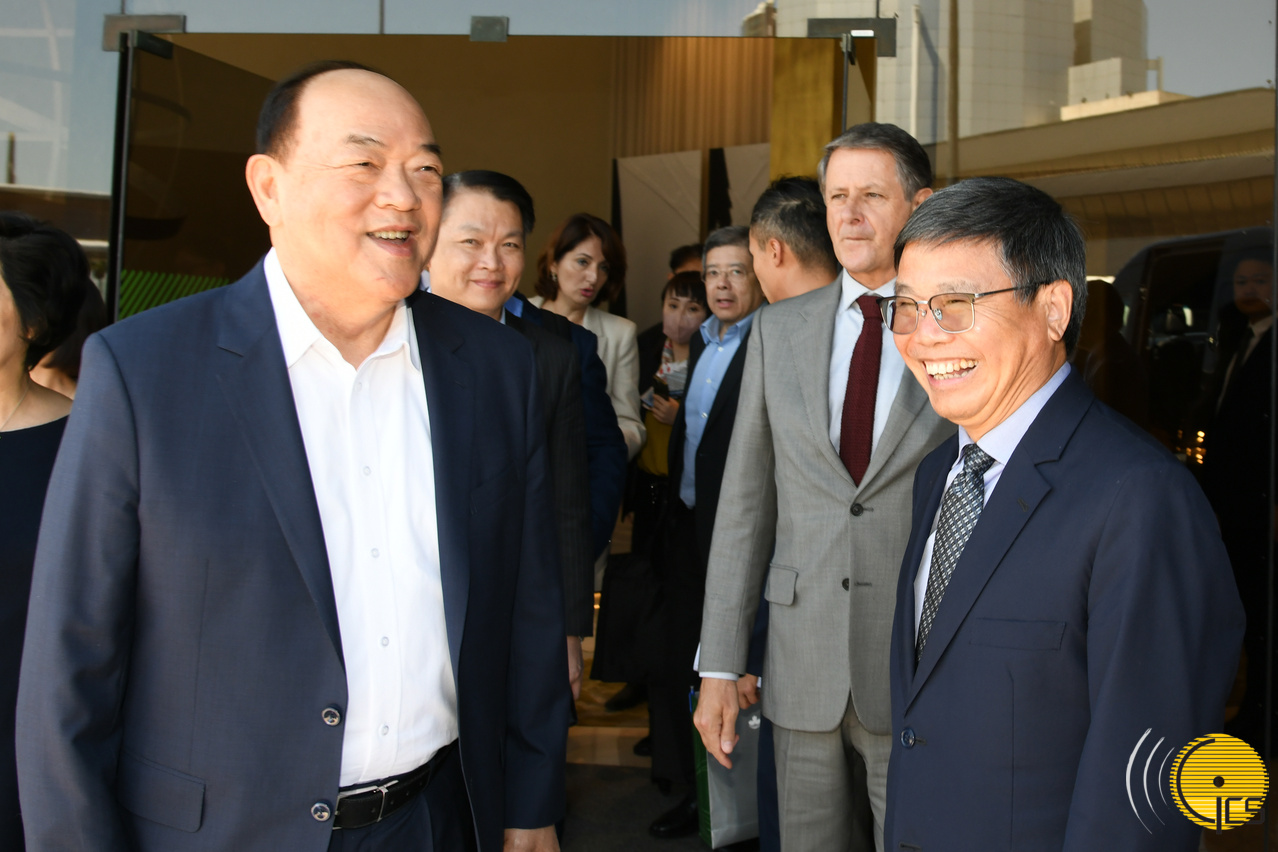 On arrival to Portugal, the Chief Executive, Mr Ho Iat Seng, is greeted at the Lisbon International Airport by the Ambassador of the People’s Republic of China to the Portuguese Republic, Mr Zhao Bentang, and the Designate Deputy Chief of the State Protocol of the Portuguese Ministry of Foreign Affairs, Mr José Carlos Arsénio.
On arrival to Portugal, the Chief Executive, Mr Ho Iat Seng, is greeted at the Lisbon International Airport by the Ambassador of the People’s Republic of China to the Portuguese Republic, Mr Zhao Bentang, and the Designate Deputy Chief of the State Protocol of the Portuguese Ministry of Foreign Affairs, Mr José Carlos Arsénio.
The Chief Executive, Mr Ho Iat Seng, attended the Macao-Portugal Investment and Tourism Promotion Conference held in Lisbon, Portugal on Wednesday (19 April), at the start of his four-day visit to that country, aiming to facilitate trade and tourism cooperation between the two places.
The Chief Executive and his accompanying Macao Special Administrative Region (MSAR) Government delegation arrived at Lisbon International Airport at about noon local time on Wednesday, being greeted by China’s Ambassador to Portugal, Mr Zhao Bentang, and Designate Deputy Chief of State Protocol of the Portuguese Ministry of Foreign Affairs, Mr José Carlos Arsénio.
Mr Ho travelled from the airport to Lisbon’s Square of Commerce (Praça do Comércio), for a brief stop at an exhibition on Macao tourism. It features promotional booths for the Macao Government Tourist Office, Macao Trade and Investment Promotion Institute, the Cultural Affairs Bureau, and Macao’s six gaming concessionaires. In the afternoon, Mr Ho attended the Macao-Portugal Investment and Tourism Promotion Conference.
The delegation led by Mr Ho includes entrepreneurs from Macao, as well as government officials and business executives from the Guangdong-Macao Intensive Cooperation Zone in Hengqin.
The Promotion Conference was a way of presenting to Portuguese entrepreneurs from various sectors, the latest information on investment and other opportunities relating to Macao and Hengqin. The conference was also pitched to governmental and other business leaders in Portugal, encouraging them to visit Macao for exchanges, exhibitions, and leisure.
Speaking at the Promotion Conference, the Secretary for Economy and Finance, Mr Lei Wai Nong, said the Portuguese Republic’s ongoing support contributed to the successful implementation of the “One country, two systems” principle in the MSAR.
He noted that, in accordance with Macao’s positioning as “One Centre, One Platform, and One Base” endorsed by the Central Government, the MSAR Government would continue to enhance cooperation between China and the Portuguese-speaking countries in a number of fields.
He added that Macao’s efforts in building a cooperation platform between China and the Portuguese-speaking countries were bolstered by the active participation of Portugal’s business and political sectors. Macao’s work relating to its platform role encompassed: the setting up of the Permanent Secretariat of the Forum for Economic and Trade Cooperation between China and Portuguese-speaking Countries (Macao); the successful hosting of five ministerial meetings and one extraordinary ministerial meeting of Forum Macao; and the establishment of the training centre of Forum Macao. The city had also become the headquarters of the China-Portuguese Speaking Countries Cooperation and Development Fund, and of the Federation of Entrepreneurs of China and Portuguese-speaking Countries. Macao also hosted the Exchange Centre for Innovation and Entrepreneurship between China and Portuguese-speaking Countries; and had built and inaugurated the China-Portuguese-speaking Countries Commercial and Trade Service Platform Complex.
Macao had evolved into an integrated services platform that had economic and trade cooperation as the pivot; and encompassed scientific research, traditional Chinese medicine, culture, tourism, conventions and exhibitions, business matters, finance, and youth entrepreneurship. As a result, Macao would be able to offer concrete support for economic and trade cooperation between China and Portuguese-speaking countries, said Mr Lei.
He went on to point out that the MSAR Government would press ahead with the “1+4” development strategy for economic diversification, and would make full use of the opportunities offered by the Cooperation Zone in Hengqin to optimise the business environment so that Portuguese and other overseas investors could use Macao and Hengqin as an entry point into the 1.4-billion strong Chinese consumer market.
For his part, the Secretary of State for Foreign Affairs and Cooperation from the Portuguese Ministry of Foreign Affairs, Mr Francisco André, told the gathering at the Promotion Conference that he was honoured to welcome the Macao delegation at the start of their visit to Europe.
He noted that Portugal and Macao had enjoyed strong ties for more than five centuries, and had maintained friendship based on mutual respect.
Macao had become a very important link between China and the Portuguese-speaking countries, and it should continue to deepen this role in future, he added.
According to Mr André, Portugal and Macao could seek new cooperation opportunities in areas such as renewable energy, economic sustainability practices, and healthcare, in addition to tourism cooperation, particularly in terms of cultural heritage.
During the Promotion Conference, two agreements were signed: a cooperation memorandum between the Portuguese Trade and Investment Agency (AICEP) and the Macao Trade and Investment Promotion Institute; and a commercial cooperation agreement between the Chinese Chamber of Commerce of Portugal and the Macao Chamber of Commerce.
In addition, the Promotion Conference featured business-matching sessions for Macao and Portuguese entrepreneurs, with the aim of helping Portuguese business people to invest in Macao and Hengqin, and giving Macao business people the opportunity to explore that overseas market.


